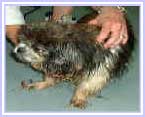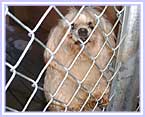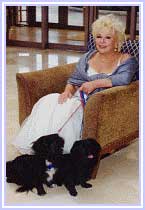|
What
Is Pound Seizure?
Pound seizure refers to the taking of cats and dogs from shelters
and pounds to serve as models in biomedical research. The practice
started many decades ago in small-scale projects, but exploded
after World War II as funding for biomedical research zoomed
upward.
When dogs and cats are acquired for research, their fates become
uncertain. While some animals may die quickly, others may be
earmarked for long-term studies. Once the pound or shelter releases
the animal for research purposes, the animal is rarely protected
by anti-cruelty laws.
Rationale
Flawed
Pound seizure proponents rationalize that animals in the shelter
are going to die anyway. After all, the argument goes, the
animals were lost or abandoned as unwanted pets. Why not use
them for research? Many humane organizations reject this argument,
insisting that animals have a right to a safe and happy existence.
Furthermore, the animals chosen for the laboratory are the
ones most likely to be adopted - young, one to three years
of age, healthy, friendly, and of medium size. Those who are
rejected by researchers are the animals least likely to find
adoptive homes.
Interestingly, the National Institutes of Health, the largest
funded of biomedical research in this country, stopped using
shelter animals in its own in-house research several years
ago because they consider such animals unsuitable research
subjects. Shelter animals are not fully known by the researcher
as are purpose-bred animals. Nothing is known about the shelter
animals' origins, health conditions, or age, and typically
the animals lack conditioning for research. Further, it is
more expensive to buy, treat, and condition shelter animals
than it is to purchase animals purposely bred for research.
A
Safe Haven For Animals?
By allowing pound seizure, we're placing a cheap price on
animal life - allowing shelters to serve as discount warehouse
suppliers for biomedical research laboratories. Shelters are
intended to be protective havens for animals, not commodities
brokers for laboratory resources.
Pound seizure is unfair to both companion animals and communities.
It violates a public trust that shelters and pounds will provide
shelter for animals and either a future with a new owner or
a humane death. Citizens might be reluctant to bring in a
stray to a shelter knowing that the animal might wind up in
a medical experiment, often involving pain and suffering.
Current
Law
Fourteen states currently prohibit the release of impounded
animals to research facilities: Connecticut, Delaware, Hawaii,
Maine, Maryland, Massachusetts, New Hampshire, New Jersey,
New York, Pennsylvania, Rhode Island, South Carolina, Vermont,
and West Virginia. Of these, Massachusetts is the only state
which specifically prohibits the sale of pound animals brought
in from other states as well. This ban has not collapsed biomedical
research in that state nor has it run up costs. instead, the
state continues as a leader in biomedical labs. Massachusetts
law is a model for other states to adopt in their jurisdictions.
Release of impounded animals for research purposes is required
in the District of Columbia, Iowa, Minnesota, Oklahoma (by
pounds only; shelters may release animals for research), South
Dakota, and Utah.
Release of impounded animals for research is allowed in Arizona,
California, Michigan, North Carolina, Ohio, Tennessee, Washington,
and Wisconsin. All other states permit pounds or shelters
to decide for themselves whether or not to provide animals
for such purposes.
To the best of
our knowledge South Florida Shelters and other Florida Shelters
do not participate in Pound Seizures. Please contact your
local shelters to ask if they participate in this practice
and ask them to stop.
Please contact
your elected officials to ask them to stop giving government
funding for lab testing on companion animals for medical research.
Suggested
Contacts
Please feel free to send this letter to different media contacts.
You can send to TV stations, as well as newspapers. If you
are sending a letter to the editor about "pound seizure,"
you must write an
original letter. The goal is to make sure the public is aware
of "pound seizure."
Contact info for your local media: http://capwiz.com/congressorg/dbq/media/
SAMPLE LETTER:
"Pound Seizure"
To
Whom It May Concern:
Some
pounds, shelters and humane societies in the United States
sell "surplus" dogs and cats to Class B dealers
and/or research facilities. This practice is commonly called
"pound seizure." Most people are not aware that
this happens. We request that you cover this very important
issue and help to educate the public.
Shelter
animals are traumatized by losing their human companions and/or
by ending up in a strange environment. They should not have
to endure even more trauma by being turned into research tools.
Shelters were not intended to be warehouses for research labs.
With "pound seizure," no one can be certain their
own beloved pet will never fall into the hands of researchers.
A lost or stolen pet may not be located or rescued in time
to prevent tragedy.
For
more information on this topic, please visit:
http://www.savetheshelterpets.com/pound_seizure.htm
The
public needs to know what is happening to these homeless,
domesticated animals. Please help bring awareness to the animals'
plight. We look forward to seeing your coverage of this issue.
Thank
you for your consideration.
Sincerely,
"If you can't
save all the shelter pets, then save just one."
|



















